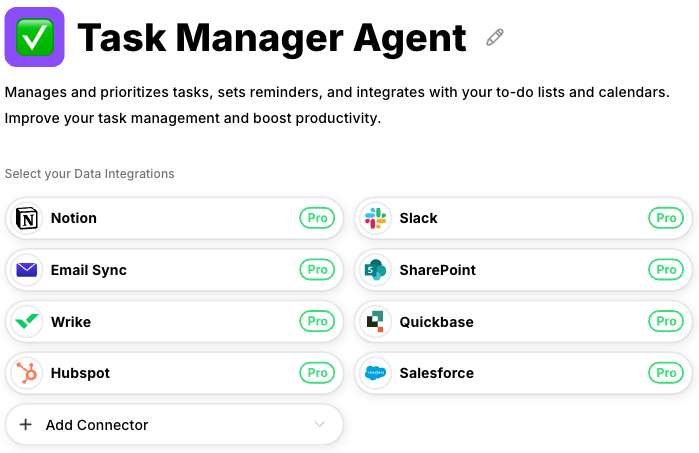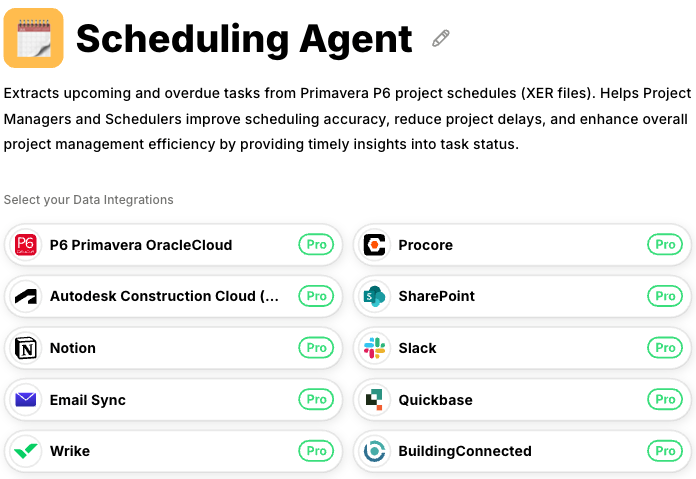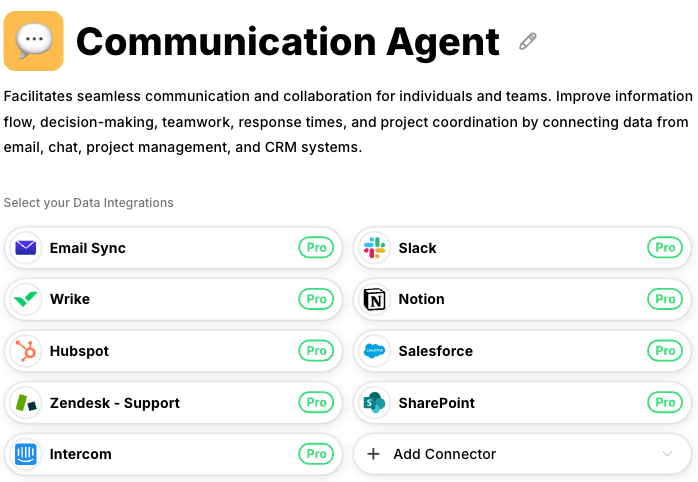This article was last updated on January 7, 2026.
Your best project manager tracks every milestone, routes documentation to the right people at the right time, and catches schedule conflicts before they become change orders. Your newest PM misses deadlines, forgets follow-ups, and lets critical tasks fall through the cracks.
The difference comes down to bandwidth, not capability. When experienced operators manage dozens of concurrent workflows, even the best systems break down. Task scheduling becomes inconsistent. Documentation routes through different channels depending on who's handling the work. Priority decisions happen in people's heads rather than in systems everyone can see.
AI agents for task scheduling change this dynamic by executing scheduling and workflow decisions automatically, applying the same logic your top performers use to every task across your operation.
What AI Agents Do for Task Scheduling
Traditional scheduling tools execute predetermined rules. AI agents adapt.
The distinction matters because operational environments rarely follow scripts. Resources shift. Priorities change. Dependencies cascade in unpredictable ways. Static scheduling systems either miss these dynamics entirely or require constant manual intervention to stay current.
AI agents perform adaptive allocation, scheduling, and optimization of tasks and resources in real time, synchronized with team members' plans, preferences, and competencies. Rather than executing predetermined rules, they apply reasoning and decision-making based on operational context, understanding that a submittal review blocking a structural milestone deserves different priority than a routine administrative task.
The practical impact shows up in three core capabilities.
- Continuous monitoring and routing. AI agents track project milestones and automatically route documentation based on status changes. When a quality inspection completes, the agent identifies which stakeholders need notification, which documents require updates, and which downstream tasks can now proceed, without anyone manually checking status or sending reminders.
- Context-aware prioritization. Instead of treating all scheduling decisions equally, agents evaluate tasks against business objectives, resource constraints, and dependencies. A cash flow deadline triggers different urgency than an internal administrative task, even if both appear on the same timeline.
- Real-time adaptation. When schedules slip or resources become unavailable, agents adjust downstream tasks automatically. The adaptation happens continuously rather than waiting for weekly planning sessions or manual intervention.
How AI Agents Execute Task Scheduling Decisions
AI agents transform scheduling workflows through four integrated technical capabilities.
Process Natural Language Scheduling Requests
Modern AI agents process scheduling requests in plain language through natural language processing and structured task decomposition. When a user submits a request like "Schedule the quarterly inventory review and notify all regional managers," the system breaks down the request into structured parameters including task type, frequency, and stakeholders. It then transforms that instruction into executable actions:
- Identify available time slots
- Check participant calendars
- Create calendar entries
- Generate notifications
- Track confirmations
Orchestrate Scheduling Across Multiple Systems
Unlike single-purpose tools, AI agents operate across systems rather than within them. Scheduling decisions might require reading project status from one platform, checking resource availability in another, updating calendars in a third, and sending notifications through a fourth. AI agents orchestrate all these steps across disparate systems rather than working in isolation within a single tool.
Allocate Task Resources Dynamically
AI agents automate task scheduling through real-time adaptive resource management. When a new task enters the queue, the agent's knowledge management system collects and systematizes detailed specifications of tasks, required resources, and employee competencies, enabling context-aware assignment decisions. The agent continuously synchronizes allocation decisions with employees' plans and preferences, enabling dynamic adjustments rather than static rule-based assignment.
Learn From Scheduling Outcomes
Advanced AI agents employ learning capabilities that enable them to adapt their behavior based on outcomes. Learning agents adjust behavior over time by analyzing past actions and refining decision-making processes, enabling continuous improvement as they accumulate experience across scheduling scenarios.
How to Implement AI Agents for Task Scheduling
Deploying AI agents requires organizational transformation, not just software installation. Cross-functional coordination and workflow redesign are essential, yet Gartner predicts that over 40% of agentic AI projects will be canceled by 2027 due to organizations underestimating deployment complexity.
Phase 1: Document Your Current Scheduling Workflows
Before any agent deployment, map how scheduling actually happens today. Identify which systems hold scheduling-relevant data, who makes scheduling decisions and what criteria they use, where handoffs happen, and what information people need to make good scheduling calls. This documentation becomes the knowledge base agents use to make context-aware decisions.
Phase 2: Start With Controlled Scheduling Pilots
Deploy agents against a limited workflow in a controlled environment. Run the system in shadow mode, parallel to existing scheduling workflows, without taking action. This validates that agents make appropriate decisions before those decisions affect real operations.
Datagrid's Task Manager Agent handles these initial deployments by prioritizing tasks based on deadlines, resource availability, and dependencies. It continuously adjusts assignments as project conditions change, enabling teams to validate scheduling logic before full production deployment.

Phase 3: Expand With Human Oversight
Deploy AI agents for specific scheduling workflows through a phased production approach that maintains human oversight and approval mechanisms. Establish clear escalation paths for scheduling situations outside the agent's training parameters. Design escalation procedures to route complex scheduling conflicts and high-stakes resource allocation decisions to appropriate human operators.
The goal is focusing human attention on exceptions rather than routine execution, not eliminating human judgment entirely.
Phase 4: Scale Task Scheduling Across Workflows
Once agents prove reliable in initial workflows, extend coverage to additional scheduling domains. Each expansion follows the same pattern. Document the workflow, deploy in shadow mode, validate decisions, then enable production execution. Avoid building "monster agents" that attempt to handle every scheduling scenario. Instead, deploy specialized agents for specific workflow types.
Where AI Agent Task Scheduling Delivers Results
AI agents for task scheduling deliver measurable improvements across multiple industries.
- Construction. Teams use Datagrid's Scheduling Agent to continuously monitor project milestones in project management platforms (e.g., Primavera P6) and automatically route submittals and RFIs for quality control workflows. The agent extracts upcoming tasks, identifies overdue items, and triggers appropriate downstream actions without project managers manually checking status across systems.

- Insurance. Carriers deploy AI agents to schedule and route claims processing workflows, automatically prioritizing urgent claims while ensuring compliance records reach reviewers before regulatory deadlines. Leading insurers report faster case assessment cycles, improved routing accuracy, and reductions in customer complaints through AI agent implementations.
- Customer Service. Operations use agent scheduling to match incoming inquiries with available specialists based on case complexity and agent expertise, reducing wait times while improving resolution rates.
- Financial Operations. Teams apply agents to cash flow management, automatically monitoring financial milestones, routing documentation, and prioritizing activities based on their impact on cash flow forecasts.
- Sales Operations. Teams benefit from AI agents coordinating customer meetings, routing proposals through approval workflows, and scheduling follow-ups based on deal stage and priority. This ensures high-value opportunities receive timely attention while routine tasks proceed automatically.
The common thread across industries is that AI agents handle the scheduling complexity that consumes operational bandwidth, freeing experienced team members to focus on decisions that actually require human judgment.
How Datagrid Enables AI Agent Task Scheduling
Datagrid's AI agents continuously monitor project milestones, automatically routing documentation and assigning tasks based on operational status. The platform connects with existing systems through data connectors that integrate with numerous platforms, so agents operate within your current technology environment rather than requiring system replacement.
For scheduling workflows specifically, Datagrid agents automate calendar management, transform scheduling practices, and reduce the coordination overhead that bogs down operational teams. Customer implementations report dramatically faster processing cycles, significantly reducing the time spent on manual coordination tasks.
Datagrid's Communication Agent facilitates coordination across teams by automatically routing status updates, scheduling notifications, and tracking confirmations. This ensures all stakeholders remain synchronized without manual follow-up that consumes project managers' time.

The platform supports multiple agent architectures. Goal-based agents handle workflow automation and long-term planning. Learning agents adjust behavior by analyzing past actions. Real-time adaptive agents continuously update their models by integrating data from multiple sources. This flexibility means scheduling automation can match your operational complexity rather than forcing workflows into a single model.
Get Started With AI Agent Task Scheduling
The transformation won't happen overnight, but each workflow moved from manual coordination to agent execution compounds, freeing your team to focus on the work that actually requires their expertise. Follow these steps to begin.
Step 1: Identify a Problem Workflow
Begin with a single workflow where scheduling inconsistency creates measurable problems. Document how decisions currently get made, what systems hold relevant data, and what outcomes you're trying to improve.
Step 2: Deploy in Observation Mode
Let agents process scheduling scenarios and recommend actions without executing changes. Validate that recommendations align with how your best operators would handle the same situations.
Step 3: Enable Automated Execution
Once confidence builds, enable automated execution for routine scheduling decisions while maintaining human oversight for exceptions.
Datagrid's AI agents help project teams work significantly faster by continuously monitoring milestones, automatically routing documentation, and streamlining repetitive tasks. This enables your entire organization to execute with the efficiency and precision of your top performers.
Create a free Datagrid account to start automating your task scheduling workflows with AI agents.













